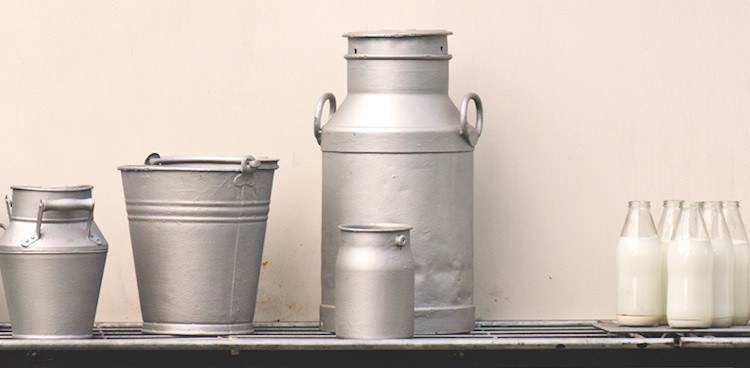
There’s much ado about raw milk these days, and with good reason. A highly nutritious source of protein, vitamins, minerals, and microflora, it also can be a dangerous product if mishandled. Like other animal source foods, contaminated raw milk can pose serious health consequences for pregnant women, infants and small children, the elderly, and those with compromised immune systems. For this reason, the federal government has banned the sale of domestic or imported raw-milk cheese aged less than 60 days, as prolonged aging creates an environment that contaminating bacteria don’t like. The legality of selling raw milk, however, is determined by individual states or counties.
Politics aside, there’s public demand for raw milk, and dairy farmers across the country have found a legal backdoor for selling it to this small but avid consumer group. By offering consumers a “share” of a cow or goat (sheep’s milk is not popular for drinking as it’s richer in fat and solids), a farmer can maintain his herd and raw-milk enthusiasts can get this highly perishable ingredient fresh from the farm. Buyers pay farmers a fee for boarding “their” animals, in exchange for a quantity of milk. While some states prohibit animal share programs, it’s still possible for consumers to legally purchase a farm share, which may include raw milk.
Legal or by loophole, dairy farmers usually find demand outstrips supply. “After we sold our dairy outside of Boulder and relocated to the Western Slope, we received many requests for raw goat’s milk,” says Jim Schott, founder of Colorado’s Haystack Mountain goat cheese, a farmstead operation until Schott’s retirement in 2008. “A lot of people prefer goat’s milk because it’s more digestible [its fat globules are smaller than those in cow’s milk]. Fortunately, the law made it possible for our customers to obtain it legally via a herd share.”
Joy Alexander, co-owner of Avery’s Branch Farms outside of Richmond, Virginia, also started a share program for her Jersey herd based on local demand. “We recommend, however, that potential shareholders visit the dairy first,” Alexander says, “so they can see that we’re all that we say we are. We want people to know our cows are healthy and live in a clean environment, and that our milk is handled with care. We have an open- door policy and encourage people to visit.”
Alexander recommends that anyone considering purchasing raw milk, whether through a share or at the farmers’ market, ask—and be allowed—to visit the dairy supplier.
Schott seconds this advice. “Consumers should always be concerned about the safety of the products they buy,” he says. “Examine the animals and the milking parlor. Ask about sanitation practices and the milk testing they have done.”
With the future of raw milk and raw milk cheese in question—the FDA is currently considering tighter regulations— dairy farmers and cheesemakers are surprisingly divided on the outcome.
“I would be reluctant to make raw milk available on a national scale,” Schott says. “We’ve seen how industrial-scale agriculture leads to problems, including foodborne illness epidemics.” Schott believes that small-scale production is better suited to providing a safe, quality product, assuming operators follow strict food safety protocol.
To learn more about milk shares, find out if raw milk is legal in your state or county, or locate a share in your area, contact A Campaign for Real Milk, a sister organization to the Farm-to-Consumer Legal Defense Fund.




